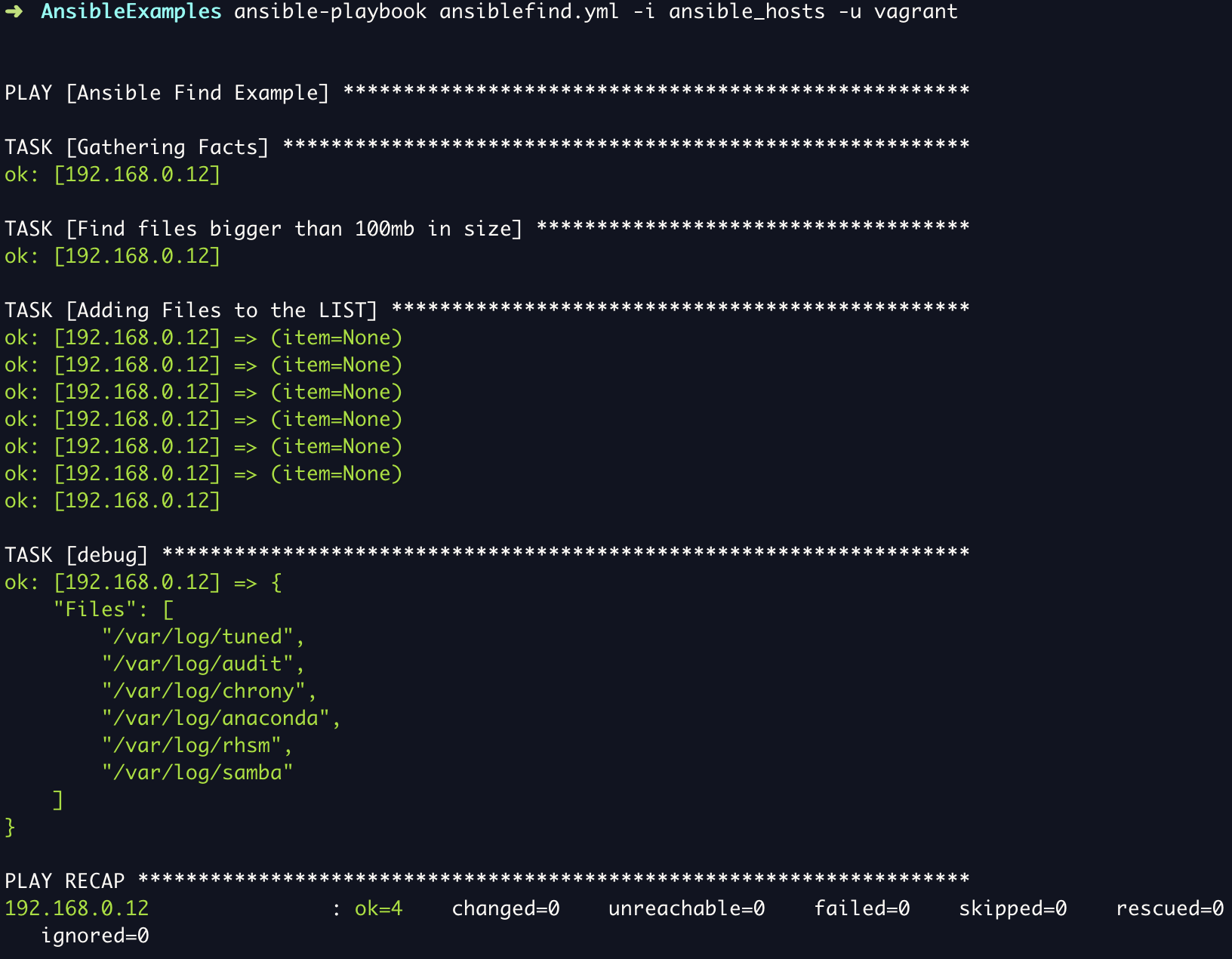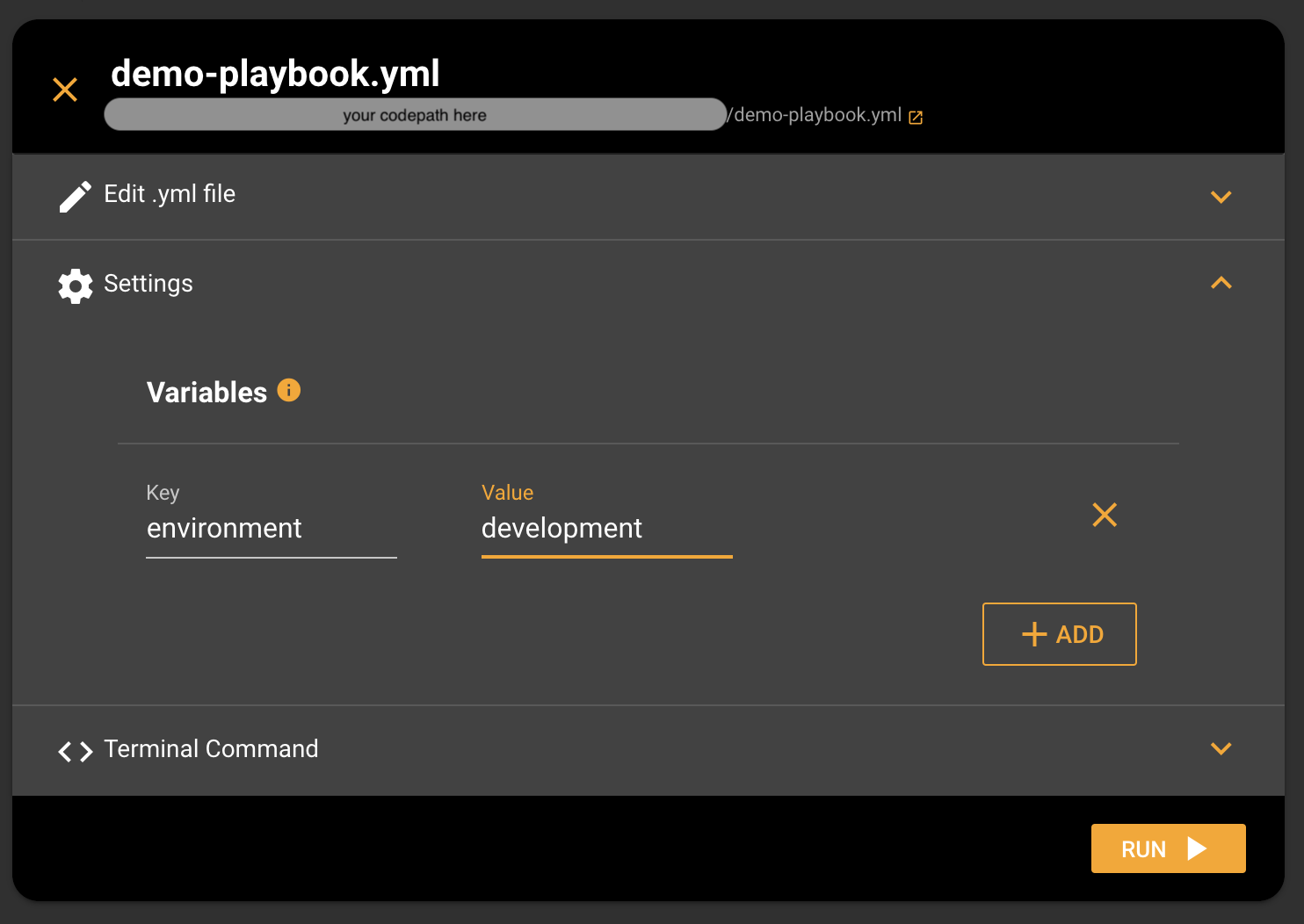
use ansible's python api to run the playbooks and get the result from a larger python script. I see there is an example of how to use the ansible.runner.Runner from python, but that seems to be useful for running modules. I would like to run a playbook from a yml file (specifying the host, and privatekey parameters directly. Ansible and Zowe CLI support many platforms including Linux on Z. Zowe CLI can also run on z/OS. In this example, we will use both of them on a control node on a Linux system. This project wraps the ansiblerunner interface inside a REST API enabling ansible playbooks to be executed and queried from other platforms. The incentive for this is two-fold; provide Ansible integration to non-python projects. Provide a means of programmatically running playbooks where the ansible engine is running on. What follows is an Ansible guide that will take you from installing Ansible to automatically deploying a long-running Python to a remote machine and running it in a Conda environment using.
What are cron jobs?

In many UNIX/LINUX type operating systems, the Cron is one of the very valuable and productive utility. It is used to run commands and scripts at pre-defined time.
These pre-scheduled jobs are called 'cron jobs'.
Some Common Cron Jobs Use Cases
- Deleting Old/Unused Files
- Regular Checking of Disk Space
- Regular Pre-Scheduled Backups
- Operating System Maintenance Jobs
- etc.
How to create a simple cron job? (Without Ansible)


Run the follwoing command at linux shell prompt:

- linux-prompt$ crontab -l # To list the crontab enteries
- linux-prompt$ crontab -e # To edit/add crontab enteries
Following is the syntax of cron job entry in the crontab file:
For Example:
- To run /path/command ten minutes every day, after midnight, following will be the entry:
10 0 * * * /path/command
- To run /path/myscript.sh at 3:30 PM on the fifth day of every month, following will be the entry:
30 15 5 * * /path/myscript.sh
- To run /path/myscript.sh at 6 PM on selected working weekdays (Monday, Tuesday and Wednesday), following will be the entry:
0 18 * * 1-3 /path/myscript.sh
How Ansible is useful to manage cron jobs?
The Ansible cron module is used to manage the crontab entries via play books. Consider, If you have many servers and you want to configure some common cron jobs on all servers, then configuring the same job manually on all servers will be tedious and error-prone task. Ansible can do this job via a simple playbook to configure the said cron jobs on all servers automatically (in one go).
Step by Step Example of using Ansible CRON module
Pre-Requisites:
1- One Ansible Control Node
2- Two Ansible managed hosts (You may use as many as you want)
3- Network access between control node and managed nodes
4- Host names of all three nodes should be registered with DNS server or appropriate entries should be present in the /etc/hosts files (on all three nodes).
5- User SSH keys should have already been generated at control node and shared with managed nodes (see this article to configure SSH Keys: http://tiny.cc/ro75fz
Note: In this article, we have used one user 'fakhar' on all three nodes. Its SSH keys have been generated at control node and shared on both managed hosts.
Call Ansible Playbook From Python
Step-1: Create an inventory file at control node (i.e. CentOS-Ctrl-Node), containing the host names of both managed servers, as shown in below image:
Step-2: Create an ansible playbook, to schedule cron jobs as shown below:
Step-3 (Optional): Run the 'tree' command at control node, where your playbook is placed (this is just to show you as how the files are placed/organized). See image below:
Step-4: Run the 'crontab -l' and 'ls -l /home/fakhar/temp.txt' on both managed hosts to confirm the status before the execution of playbook. See image below:
Step-5: Run the playbook using command 'ansible-playbook -i inventory cronPlayBook.yml' at control node. See image below. The playbook has been executed successfully.
Step-6: Check the result on the target managed hosts after the cron job scheduled time. For this purpose, run the 'crontab -l' and 'ls -l /home/fakhar/temp/txt' commands on both managed hosts. See image below, the cron job entries have been created and executed at specified time. The cron jobs have collected the system information and placed it in the target file (i.e. /home/fakhar/temp.txt) successfully.
Ansible Runner Python Example Interview
Thank you.